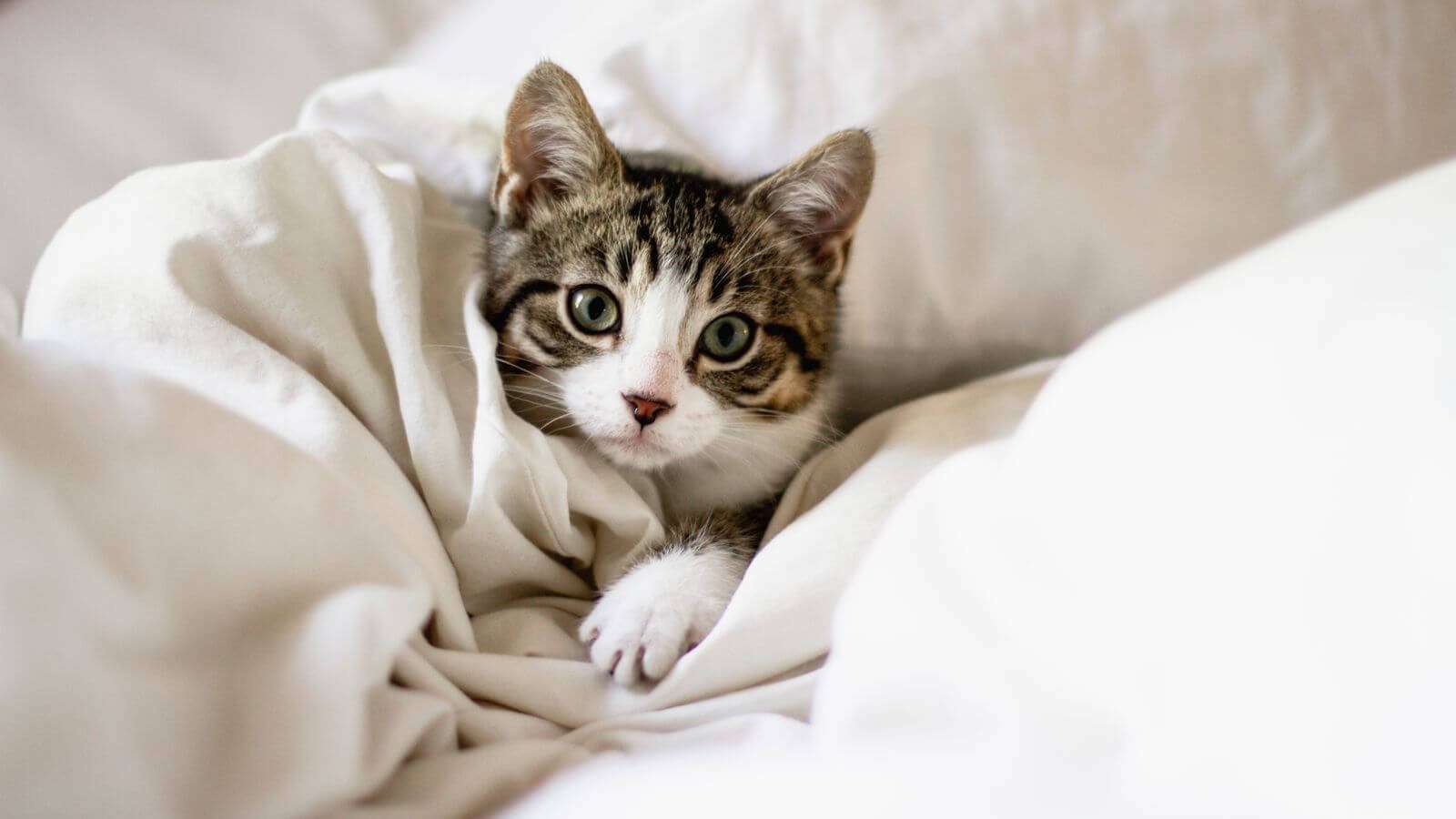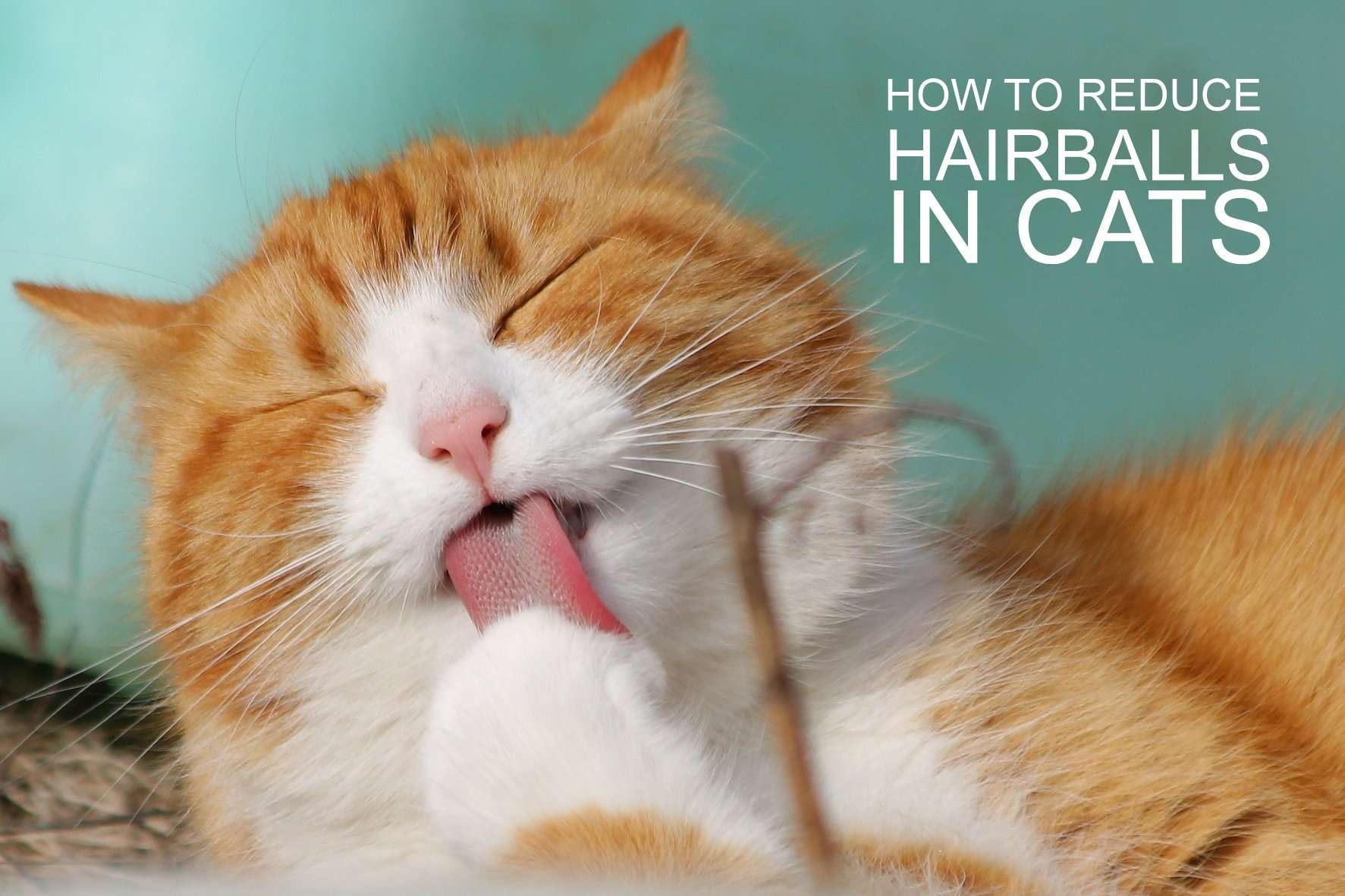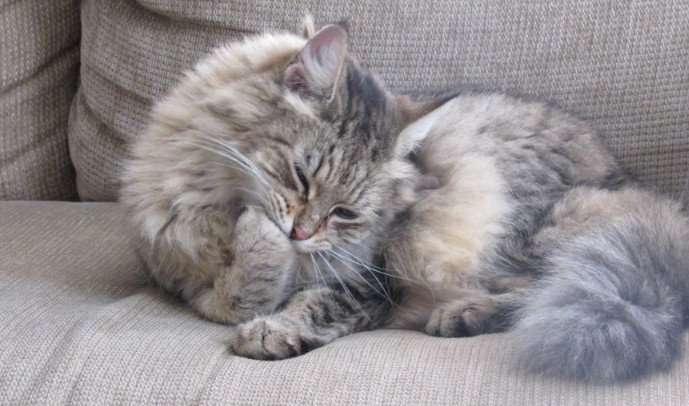How Often Do Cats Have Hairballs
Some cat owners think that their pet brings up a hairball every day, but this isnt true. Cats should only get hairballs occasionally, usually less than once a month. Most hairs swallowed from grooming will pass through the digestive system and out into the litter box without a problem.
However, if your cat has hairballs frequently, its worth taking them to see a vet. Numerous cat hairballs could be a symptom of a problem in the gastrointestinal tract in this case, it is best to check this out as soon as possible.
Numerous hairballs in cats can also be a symptom that your cat is over-grooming. Cats tend to over-groom when they are stressed a bit like us biting our fingernails and thus will consume more hair, leading to more hairballs. If you think your cat may be stressed, take them to the vet.
Your Cat Has Hairballs: Should You Worry
When your cat hacks up a slimy fur sausage of a hairball, you may be disgusted or annoyed . You may also wonder whether thats normal. An occasional regurgitated wad of hair isnt cause for alarm, but frequent hairballs might mean your cat has an underlying health problem, such as anxiety, allergies, or an imbalanced gut microbiome .
What Causes Hairballs In Cats
Hairballs may be disgusting, but they develop as a result of your cats healthy and fastidious grooming routine.
When your cat grooms themselves, tiny hook-like structures on their;tongue catch loose and dead hair, which is then swallowed. The majority of this hair passes all the way through the digestive tract with no problems. But if some hair stays in the stomach, it can form a hairball. Usually, your cat will vomit the hairball to get rid of it. Because hairballs pass through the narrow esophagus on the way out, they often appear thin and tube-like, rather than round.
Hairballs in cats are more likely to appear in long-haired breeds, such as Persians and Maine Coons. Cats that shed a lot or who groom themselves compulsively are also more likely to have hairballs, because they tend to swallow a lot of fur. You may have noticed that your cat didnt have hairballs as a kitten, but developed them as they grew. This is quite normal — as cats get older they become more adept groomers and therefore more proficient at removing fur from their coats with their tongues, which means more hairballs for you to clean up.
Recommended Reading: How Many Calories Should Cats Eat
What Should You Do If Your Cat Has Hairballs
If your cat brings up the occasional furball, then no treatment is likely required. If this becomes more common, it might be worth considering increasing your grooming, changing the diet, or trying a laxative as described above.
If that doesnt work or you are concerned, it is always safest to have your animal checked out by a veterinarian to rule out more severe conditions and get help in managing hairballs.
All Coughing Doesnt Mean Hairballs

Unfortunately, hairballs are common for most cats. It is important to keep in mind, however, that there are several ailments that are too easily written off as hairballs.
- Heartworm: a lung disease, well known in dogs, but also can affect cats.
- Foreign bodies: Cats can ingest foreign bodies like string and ribbons from their toys, hair ties, or even the grasses that cats like to eat can get lodged in their throats.
- Asthma and allergies: The most common cause are chemical irritants from litter dust, air fresheners, diffusers, flea spray and powders.
Recommended Reading: Cats Age In Human Years
Can Cats Poop Out Hairballs
Yes, but sometimes they need extra push. Cats groom themselves by licking their body made of fur which causes them to swallow loose hair. The swallowed hair normally goes right through its gastrointestinal tract and comes out with stool. Sometimes the cat cannot pass hair from its digestive system on its own. The hair collected in the cats stomach forms into hairballs. So the hairball gets stuck in the cats tummy.
Watching For More Serious Symptoms
Don’t Miss: What Color Is Pete The Cat
Treatment For Cat Hairballs
A follow-up visit is required to verify that your cat is responding properly to the treatment you are providing. A follow-up appointment is very necessary if a surgical procedure was used to remove a hairball. It is important to consult with your veterinarian to ensure that your cat recovers and develops normally, and to get advice on how to prevent hairballs in the future.
Q Do Furballs Ever Need Veterinary Treatment
A Hairballs may need a prescribed medication if they cause a blockage in your cats intestine. While this is quite rare, some elderly cats can suffer from constipation and a hairball could then cause additional problems. So, if your cat was bothered by hairballs in her younger years, or her litter-box habits arent as regular as they once were, your vet may prescribe an anti-furball laxative. Its thick, sticky consistency de-fluffs your cats gut by gathering up all the hair and passing it out safely in her poo.
Read Also: Is Dried Eucalyptus Safe For Cats
Cat Hairball Symptoms And Signs
Occasionally, your cat may vomit a particle that is the same color as their fur, which will most likely consist of hair in addition to other digestive contents. In terms of hairball symptoms, the following are the most often encountered:
- the solids or liquids that have been vomited
- A hairball in the form of a cylinder
- Coughing, wheezing or choking when outside in the heat
- Loss of appetite
- Constipation or diarrhea are two different things.
- Increasing the size of the abdomen
- Inadequate resources or a lack of initiative
If your cat vomits regularly or exhibits other symptoms, you must take him to the veterinarian. If this happens, it may be a sign of intestinal blockage.
Are Hairballs In Cats A Health Issue
It depends. Hairballs in cats are a naturalalbeit not funway for a cat to rid herself of hair that gets stuck in her stomach and are normal on occasion. But if they occur frequently or if you see or hear your cat retching, vomiting, or coughing without the eventual appearance of a hairball, you should talk to your veterinarian. Other signs that hairballs might be a health issue you should discuss with your vet include constipation, an extraordinary amount of hair in stools, a loss of appetite, and lethargy. Additionally, if you start to see the number of hairballs increase, or you see your cat grooming more often than usual, it might be a sign of a larger skin condition that you should speak to your vet about.
Don’t Miss: Can Humans Get Distemper From Cats
How To Help Your Cat Pass A Hairball Quickly And Easily
In this article, we will be taking a look at how to help your cat pass a hairball as quickly and easily as possible. Hairballs are the bane of many cat;owners lives and we;always see a steady number of cat owners asking for assistance on how best to deal with the problem.
We have researched the topic to save our;readers having to do it themselves and hope that this article will help as many of our readers as possible. We have found what we feel is the best commercial product on the market as well as one home remedy that has had some success in helping cats pass hairballs.
Can Cat Hairballs Get Stuck

This is a possibility. Most cats will pass hairballs very quickly. They will gag or wretch, and you will soon get used to the precise sounds that they make during this process. Developing an ear for these noises helps if you are out of the room and hear something strange. Then the hair will come out and they will move on leaving you to handle the mess.
But, there may be times where they seem to gag a little more noisily or wretch for longer. They may be struggling to pass the hairball and could choke. If this continues for too long and the cat starts to get distressed, take them to see a vet. There may be a blockage that they cant handle on their own.
You May Like: Do Cats Like Lavender Plants
Hairballs And Your Cats Gut Microbiome
Frequent hairballs may be a sign that the digestive systems ability to move material alongits motilityis impaired. Reduced motility means that your cat’s food and moisture dont progress through the intestines the way they should, and digestion suffers. But another important aspect of proper motility is that it limits the amount of time that pathogens and antigens are in contact with the intestinal walls. When these substances arent properly cleared away from the lining of the gut, the resulting bacterial overgrowth can interfere with the bodys absorption of nutrients.
We know that the relationship between motility and the microbiome is a two-way street: changes in the way the intestines move material along can cause changes in the gut microbiome, but the microbiome also greatly influences the motor function of the gut. For example, short-chain fatty acids, which help regulate intestinal motility, are produced when beneficial bacteria in the gut ferment complex carbohydrates.
When a cats gut bacteria populations are out of proportion or key beneficial bacteria are missing, we describe the gut microbiome as imbalanced. An imbalanced gut microbiome is one of the factors that can lead to inflammatory bowel disease , and chronic inflammation of the digestive tract can severely disrupt motility.
A Good Diet Is The Key:
Cats have problems digesting carbohydrates. There are some high quality foods in the market those help to prevent this issue. They are designed to; intake high protein. So keep your cat low in carbs and add more protein to its everyday meal. They must stay grain-free. Poor nutrition will grow problems like a hairball and other health issues.
Also Check: Cat Allergy Anaphylaxis
What Remedies Help Cats Pass Hairballs
If your cat is getting hairballs, its important to brush them on a regular basis, Paolillo says. This removes extra hair so they arent ingesting as much of it. Giving them baths also helps remove dead hair before it causes a problem.;
Your vet may also recommend a laxative to make it easier for the hair to come out the other end without being vomited, Paolillo says. These products make hair slicker so they pass through the digestive system more easily without clumping together and causing a blockage.;
How Can I Prevent Hairballs
If your cat is prone to hairballs, the following may help. Always seek veterinary advice and discuss your cats individualized care.
- Improve skin and coat care:
- Comb out loose hair every day; use a damp cloth or paper towel to remove fly-away hairs after combing so your cat doesnt swallow them.
- Clipping long-haired cats may be required.
- Look for causes of pain if your cat is focusing on grooming a particular area.
- Look for other causes of skin discomfort.
*Cannon M. Hairballs in cats. A normal nuisance or a sign that something is wrong? J Feline Med Surg 2013; 15: 21-29.
Read Also: How Old Is A 12 Year Old Cat
Q Any Prevention Tips
A Brushing your cat regularly with a soft brush can definitely help, and you should aim for a once-a-day grooming session for longhaired breeds, or a weekly one for shorthaired cats. If your cat is prone to furballs, you can also consider an anti-hairball dry food. These kibble-based diets usually contain vitamins and minerals to improve the condition of your cats fur and reduce hair loss, plus they have plenty of fibre to help sweep the excess fur through her digestive system. By and large, hairballs are a digestive issue rather than a breathing problem, so its important to recognise the difference between the two. If your cat is coughing or gagging regularly, never just assume that its a hairball. If youre in any doubt, always have a chat with your vet.
What Are The Symptoms Of Cat Hairball
Cats are generally very energetic. They need very minimal care. They are more likely to make a fuss all the time. When they grow hairballs in them, they dont seem to be that much energy. They lack energy or show lethargic movement. Sometimes they start eating grass or nibbling on it. They also constipate if they grow hairballs in them. If symptoms like these last for two to three days then they should be checked by the nearest veteran. Some common symptoms that your cat has a hairball stuck:
- Vomiting
- Loss of appetite
Don’t Miss: Do Dachshunds Get Along With Cats
Are There Any Natural Remedies For Hairballs
The problem with some medicines and treatments is that they contain petrolatum. Some natural alternatives avoid this substance and often use some combination of elm bark, marshmallow root, papaya, and psyllium seed. Check the ingredients and methods of any product before you buy.;
Read Also: What Can Cats Eat From The Fridge
Excessive Hairball Production Could Also Be The Result Of Psychological Issues

If there is no clear sign of gastrointestinal distress, there could be a psychological issue here. Excessive grooming is one way for cats to deal with stress. They will lick their fur far more than is necessary and end up ingesting too much. They may not struggle to pass the hairballs or show any physical distress, but it is still important to deal with any possible problems to reduce that compulsion to groom.
Take a look at your cats routine and their interactions with other members of the family. Is there some trigger somewhere that is stressing them out? Or, perhaps there has been a change in your routine. It isnt uncommon for cats to get stressed after moving house. Excessive grooming and hairball production could occur then.
Don’t Miss: How To Make A Shirt For A Cat
Can Hairballs Be Dangerous
Pictured: Bug the cat had hairballs often. After completing AnimalBiome’s supplements, his loving human reported that he occasionally has a hairball, but nothing like before.
If a hairball gets stuck somewhere in the digestive tract, the resulting blockage can be life-threatening. Gastrointestinal blockages require prompt surgical intervention, so if your cat has any of these symptoms of a possible blockage, see your veterinarian immediately:
- repeated unproductive retching
Pictured: Bug’s four inch size cat hairball that needed to be surgically removed by his veterinarian.
Why Do Cats Cough Up Furballs
It all starts with grooming. The rough texture of a cats tongue is magnificent. Ghe ultimate cleaning tool in many respects. However, the tongues ability to capture dirt and debris also picks up loose fur like a magnet.
Additionally it is estimated that cats spend as much as 25% of their daily waking hours in grooming mode. The more your cat grooves the more odds increase that at least some of that dislodged fur will be consumed.
As more fur is taken in it begins to clone together within the stomach. Once a club or ball of fur has formed it can be quite difficult to pass through the normal process of elimination. This can lead to hacking and vomiting.
Especially long-haired cats that are of senior status can often succumb to these issues on a fairly regular basis. Longer fur coupled with a worn down and unforgiving digestive system can make hacking and vomiting and the coughing up hairballs, all the more frequent.
You May Like: How To Get Your Kitten To Stop Biting
Taking Your Cat To The Vet